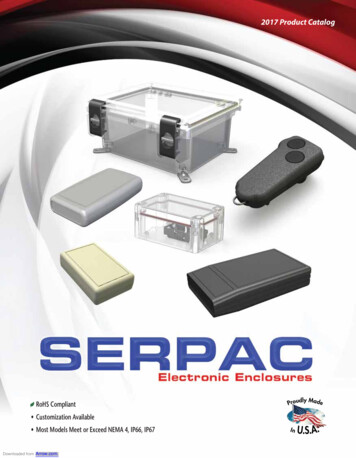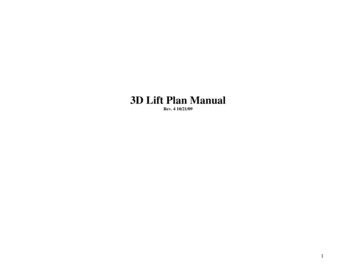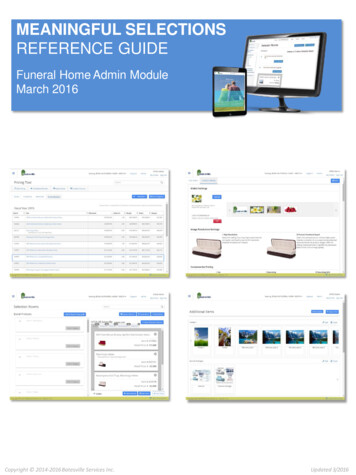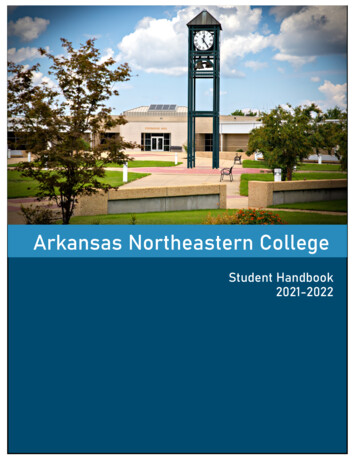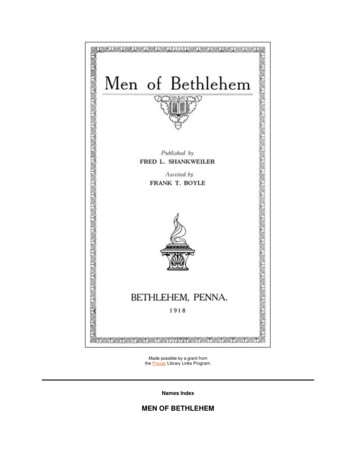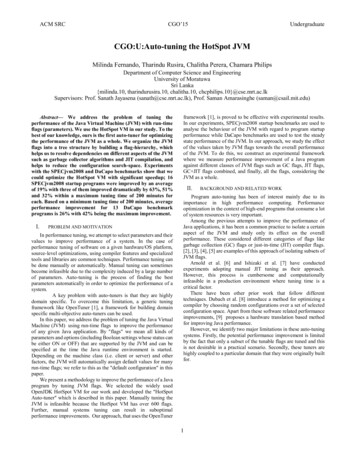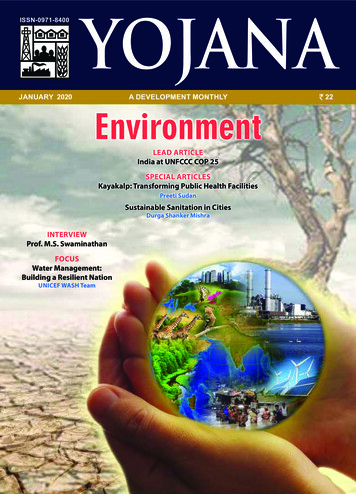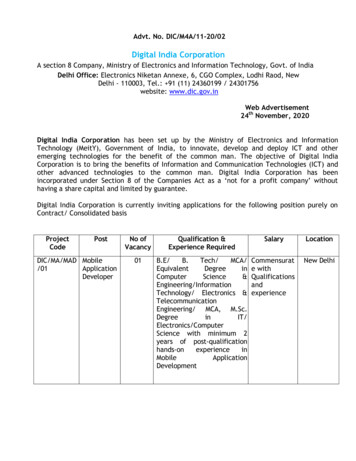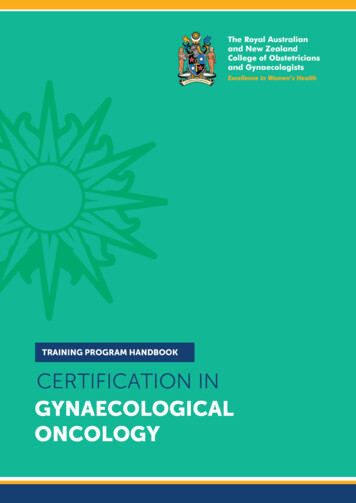
Transcription
CGO 2022 Handbook v1Page 1 of 65CGO 1 - 01
IMPORTANT NOTICE:INFORMATION AND REGULATIONS IN THIS HANDBOOKRegulationsEvery effort has been made to ensure that the Information and College Regulations in thisHandbook were correct at the time it was itution-regulationsRANZCOG Policies Relating to TrainingFor all the College policies governing the CGO Training Program refer oceduresUpdatesA regularly updated version of the Handbook is available on the College website, and readers arestrongly advised to consult the website version when checking Information or regulations:www.ranzcog.edu.au/trainingPublished byThe Royal Australian and New Zealand College of Obstetricians and Gynaecologists 1 Bowen Crescent, Melbourne,Victoria, 3004, AustraliaThis work is subject to copyright under the laws of Australia and, through international treaties, and othercountries. Apart from any use as permitted by law, no part may be copied, reproduced or stored in a retrievalsystem or made available to the public by any means or process without written permission from The RoyalAustralian and New Zealand College of Obstetricians and Gynaecologists (RANZCOG). Requests and enquiriesconcerning reproduction should be directed to the Chief Executive Officer, RANZCOG, 1 Bowen Crescent,Melbourne, Victoria, 3004, Australia RANZCOG 2022CGO 2022 Handbook v1Page 2 of 65CGO 1 - 01
Table of ContentsIMPORTANT NOTICE: INFORMATION AND REGULATIONS IN THIS HANDBOOKTable of Contents23COLLEGE VISION, MISSION AND MOTTO5COLLEGE INFORMATION6Subspecialties Staff Contact DetailsCollege Training and Education CommitteesBullying, Harassment and Discrimination in the Workplace PolicyTrainee SupportRANZCOG Exceptional Circumstances, Special Consideration and Reconsideration6791011TRAINING ADMINISTRATION12Components of the CGO Training ProgramA Year-By-Year Guide for TraineesRequirements of the CGO Training ProgramTraining DocumentationApplying to Commence Training in the CGO Training ProgramScholarly Elective Research Stream (Research Project)Workplace-Based Assessment (WBA)ExaminationsApplying for Certification as a CGO SubspecialistCurriculumAims1. Knowledge and Understanding1.1 Epidemiology and Aetiology1.2 Anatomy1.3 Physiology and Pathophysiology1.4 Genetics1.5 Pharmacology and Therapeutics1.6 Pathology1.7 Immunology1.8 Analysis of Clinical Information and Research1.9 Diagnostic Techniques1.10 Clinical Management1.11 Professionalism and Management1.12 Teaching1.13 Ethics and the Law1.14 Culture2. Clinical and Management Skills2.1 Gynaecological Oncology2.2 Surgical Skills2.3 Surgical Procedures2.4 Critical Care2.5 Management and Professional 404041424548494949505051525454CGO 2022 Handbook v1Page 3 of 65CGO 1 - 01
RECOMMENDED RESOURCES57APPENDICES58AcronymsAbbreviations Used/Accepted in CGO Subspecialty Examinations and Training DocumentationGlossary of Terms585960CGO 2022 Handbook v1Page 4 of 65CGO 1 - 01
College Vision, Mission and MottoVisionThe Royal Australian and New Zealand College of Obstetricians and Gynaecologists will pursueexcellence in the delivery of health care to women and their families throughout their lives.MissionRANZCOG will achieve its Vision by innovative training, accreditation and continuing educationsupported by active assessment of the effectiveness of those programs.The College will actively support and communicate with Fellows, members and trainees in order toensure that they are capable, physically, psychologically and professionally, of providing the higheststandards of care.The College will support research into women’s health and will act as an advocate for women’s healthcare, forging productive relationships with individuals, the community and professional organisationsboth locally and internationally.MottoExcellence in women’s healthCGO 2022 Handbook v1Page 5 of 65CGO 1 - 01
College InformationSubspecialties Staff Contact DetailsCGO Training Program CoordinatorPhone: 61 3 9412 2924Email:cgo@ranzcog.edu.auAssessment ServicesEmail:assessment@ranzcog.edu.auTraining and Support .au0429 577 t-unitCGO 2022 Handbook v1Page 6 of 65CGO 1 - 01
College Training and Education CommitteesStanding Committees of the Board have been established to formulate and review training andassessment requirements leading towards the attainment of subspecialty certification. BoardCommittees usually meet in March, July and November.Education Standards Committee (ESC)Chair: A/Professor Gregory JenkinsThe ESC oversees the ongoing development and implementation of educational standards across allRANZCOG education, training, assessment and accreditation. The Committee is responsible for theCollege’s training programs, including regular monitoring and evaluation and is delegated by the Boardto make decisions relating to its area of responsibility.The responsibilities of ESC include the following: oversight of all education, training, assessment and accreditation of RANZCOG programs toensure contemporary and high quality delivery; consideration of ongoing developments in specialist medical education and training, ongoingmonitoring of assessment processes and developments in training modalities, includingsimulation and other initiatives and consideration of possible application to College educationand training programs; formulation of recommendations and development of discussion papers regarding strategicinitiatives in line with the College’s strategic objectives; development, implementation, monitoring, and evaluation of the currency, reliability andvalidity of all components of the RANZCOG Training and Assessment processes; reviewing and responding to contemporary practices and AMC and MCNZ Standards forSpecialist Medical Training in consultation with key stakeholders as appropriate; establishing Recognition of Prior Learning (RPL) panel from its members to assess, review andrecommend assessment criteria for applicants who are prospectively approved to commencethe FRANZCOG Training Program and see to obtain recognition of relevant training, whichpredates the commencement of their FRANZCOG training; and establishing prevocational pathway panels as required to review requirements forprevocational trainees (as set by AMC/MCNZ), oversee quality assurance and continuousimprovement of the RANZCOG PVP (including update of educational content), and ensurecompletion of the PVP is aligned to FRANZCOG selection requirements.Education & Assessment Committee (EAC)Chair: Dr Michael RasmussenThe EAC is responsible for ensuring, maintaining and enhancing the integrity, validity and reliability ofthe individual and collective education and assessment components and associated processespertaining to training programs run and administered by the College.Such assessment components include, but are not limited to: Certificate in Women’s Health (CWH), DRANZCOG, FRANZCOG and Subspecialty WrittenExaminationsDRANZCOG Advanced, FRANZCOG and Subspecialty Oral ExaminationsIn-hospital Clinical Assessments (IHCAs) and In-hospital Clinical Examinations (IHCEs)research component of the FRANZCOG Curriculum and Subspecialty programs trainee competence in defined O&G surgical procedures. CGO 2022 Handbook v1Page 7 of 65CGO 1 - 01
Training Accreditation Committee (TAC)Chair: Dr Peter NeilThe TAC is responsible for the ongoing development, coordination and administration of theFRANZCOG Training Program in cooperation with the Regional/New Zealand Training AccreditationCommittees and review the processes for accreditation and reaccreditation of the training programsleading towards the attainment of Fellowship of the College.Such training/accreditation matters include, but are not limited to: approval of Integrated Training Programs (ITPs) and participating hospitals within thoseprograms as suitable for RANZCOG training, and the approval of hospitals applying to joinexisting ITPs; approval of applications for admission to Fellowship of the College, and the formalrecommendation to the RANZCOG Board of approved applications; reaccreditation of ITP and/or Elective training sites in Australia and New Zealand, includingconducting re-accreditation site visits every four years and follow-up visits as required, formallyreporting on those reaccreditation assessments, and the ongoing review of the College’shospital reaccreditation guidelines; development and continuous review of College regulations governing training, siteaccreditation and certification for the FRANZCOG Training Program; collaborating with the Education Strategy Committee on the implementation of educationalstrategy decisions for the FRANZCOG Training Program.Subspecialties CommitteeChair: Dr John ReganThe Subspecialties Committee, through its five subcommittees, is responsible for overseeing theformulation and review of the training, assessment and accreditation policies leading towards theattainment of subspecialty certification of the College.Recommendations on assessment matters are referred to the RANZCOG Board in conjunction withthe Education & Assessment Committee.Recommendations on training and accreditation matters are referred directly to the RANZCOG Board.The Committee is responsible for the assessment of Specialist International Medical Graduates(SIMGs) for RANZCOG subspecialist recognition and reports directly to the RANZCOG Board on thismatter.Such training, assessment and accreditation matters include, but are not limited to Overseeing the process of ongoing development, coordination and maintenance of theCollege’s subspecialty training programs, the assessment of the trainees enrolled in thoseprograms and approval of training supervisors. Making recommendations to the RANZCOG Board, in conjunction with the College Education &Assessment Committee, on matters relating to the College assessment process, including theResearch Project, Written and Oral Examinations and the In-hospital Clinical Examinations. Overseeing the process of selection of subspecialty trainees. Making recommendations to the RANZCOG Board of new training posts and the reaccreditation of existing training posts.CGO 2022 Handbook v1Page 8 of 65CGO 1 - 01
Reporting to and liaising with the Training Accreditation Committee on matters pertaining tosubspecialty training. Making recommendations to the Continuing Professional Development Committee on matterspertaining to recertification. Overseeing the process of assessment of International Subspecialists applying for subspecialtyrecognition in Australia and New Zealand.Certification in Gynaecological Oncology (CGO) Subspecialty CommitteeChair: Dr Archana RaoThe CGO Subspecialty Committee is responsible for the overseeing the formulation and review of thetraining and accreditation policies leading towards the attainment of Gynaecological Oncologysubspecialty certification of the College. Recommendations on assessment matters are referred to theRANZCOG Board through the Subspecialties Committee and the Education & Assessment Committee;recommendations on training and accreditation matters are referred directly to the RANZCOG Boardor to the RANZCOG Board through the Subspecialties Committee. Recommendations concerningSpecialist International Medical Graduates (SIMGs) assessments for RANZCOG subspecialtyrecognition are referred by the Committee through the Subspecialties Committee to the RANZCOGBoard for consideration.The CGO Subspecialty Committee is also the Board’s expert representative on matters pertaining totheir subspecialty. As such the CGO Subspecialty Committee may be asked to provide advice orcontribute to requests as appropriate. All correspondence pertaining to the work of these Committeesshould be forwarded to the Chair of the relevant Committee at the address below.C/O RANZCOG1 Bowen CrescentMelbourne, Victoria, 3004Email: cgo@ranzcog.edu.auBullying, Harassment and Discrimination in the Workplace PolicyThis policy relates to the behaviour of members, Fellows, and trainees of the College in roles pertainingto RANZCOG training, including supervision, oversight, reporting and assessment.The purpose of this policy is to protect RANZCOG trainees, members and Fellows against bullying,harassment and discrimination in the workplace. The workplace includes training sites in public andprivate hospitals, private practice settings and the College environs.The College is committed to ensuring fair and equitable workplace practices and does not toleratebullying, harassment or unlawful discrimination in any workplace. Discrimination, bullying andharassment are prohibited by law and workplace participants who engage in such conduct may beheld personally liable for their actions. This includes threatening behaviour, intimidation, exclusion orphysical violence.The full Bullying, Harassment and Discrimination in the Workplace Policy is available via the Collegewebsite: duresCGO 2022 Handbook v1Page 9 of 65CGO 1 - 01
Trainee SupportTraining Support Unit (TSU)RANZCOG is committed to supporting trainees and therefore has established the TSU. This is a safe,professional and impartial service for trainees to contact should guidance and support, be required.The Trainee Liaison has a background in mental health, counselling and public health services. The TSUencourages trainees, consultants and training supervisors to reach out at times of difficulty. The TSUcan also assist with the following: processes for management of complaints development of resources referral to appropriate internal and external support resources and services identification of a range of potential intervention strategiesTrainees are encouraged to contact Carly Moorfield, Senior Coordinator, Trainee Liaison in times ofpersonal or professional stress, anxiety or poor health.Carly Moorfield (Senior Coordinator, Trainee 429 577 302Website: nitConverge InternationalTo further support Trainees the TSU has established a partnership with Converge International. (Vitaeis the NZ equivalent).Converge International is a confidential support service that is open to our Trainees, 24/7/365. Thisservice can be utilised for any personal or work-related matter. support is confidential and privateEAP Counselling, Family Assist and Crisis Telephone Counselling Sessions (these are funded byRANZCOG)support that can be tailored to meet our Trainees needs (face-to-face, telephone or online)services are available across Australia and New Zealand (Vitae – NZ equivalent)For more information please contact: Converge International on:Phone: 1300 687 327 (Australia)Website www.convergeinternational.com.auPhone: 64 0800 666 367(New Zealand)Phone: 61 386 205 300(International)CGO 2022 Handbook v1Page 10 of 65CGO 1 - 01
RANZCOG Exceptional Circumstances, Special Consideration and ReconsiderationThis policy outlines the criteria and processes by which those individuals subject to RANZCOGregulations and/or policies pertaining to a range of requirements, including those associated withtraining and assessment, may apply for variation to the normal requirements on the grounds ofexceptional circumstances that may justify special consideration.As such, the application of this policy includes the following groups: Applicants for a position on a RANZCOG training program Trainees undertaking the Basic training or advanced training components of the FRANZCOGtraining program Trainees undertaking a RANZCOG subspecialties training program Trainees undertaking the certificate of women’s health, DRANZCOG or the DRANZCOGadvanced Specialist International Medical Graduates (SIMG) being assessed for comparability to aRANZCOG trained specialist in obstetrics and gynaecology or suitability for an area of needposition, or undertaking training / assessment / supervision requirements as part of a pathwayto obtain RANZCOG Fellowship SIMG being assessed for comparability to a RANZCOG trained subspecialist or undertakingtraining / assessment requirements as part of a pathway to obtain certification by RANZCOG asa subspecialist Fellows and other College members required to undertake a continuing professionaldevelopment (CPD) program for the purposes of recertification / renewal of CollegemembershipThis policy should be read in conjunction with the college’s appeals procedures and the processesdescribed therein followed before initiating any request for an informal review of a decision pursuantto the appeals procedures. Search Special Consideration and Reconsideration Policy iderationThe application form for trainees requesting special consideration on the grounds of exceptionalcircumstances in relation to an examination can also be found on the policy page.CGO 2022 Handbook v1Page 11 of 65CGO 1 - 01
Training AdministrationComponents of the CGO Training ProgramThe CGO training program consists of three clinical years, all of which must be prospectively approved.It includes the following elements:Gynaecological OncologyTrainees must actively participate in the work of an approved Gynaecological Oncology unit for aminimum of two years. Because of difficulties in obtaining specific advanced training posts in ‘generalsurgical units’, it will be usual for trainees to spend three years in Gynaecological Oncology units.General SurgeryIt is desirable, but not mandatory, that there be participation in the work of a general surgical unit,particularly in the areas of gastrointestinal and urological surgery, for ONE year. The work should beat an advanced level and this should be reflected in a logbook of cases.Medical OncologyIt is desirable, but not mandatory, that there be sufficient participation in the medical oncologymanagement of patients to provide an appropriate training. A specific attachment to a medicaloncology unit is not required, but if obtained, no more than three months will be accredited.RadiotherapyIt is desirable, but not mandatory, that trainees participate as a member of a team in planningradiotherapy and performing radiation treatment. A specific attachment to a radiation oncology unitis not required, but if obtained, no more than three months will be accredited.Pathology SessionsTrainees must participate in pathology sessions, including tumour board meetings, as related togynaecological oncology.Scholarly Elective - Research ProjectTrainees must participate in the planning, conduct, and reporting of research in gynaecologicaloncology.Surgical SkillsTrainees must demonstrate surgical competence in the following procedures by the end of Year 2of training: PSW exploration and dissection / exposure (open) PSW exploration and dissection / exposure (laparoscopic/minimal access) * PSW exploration/lymphadenectomy (laparoscopic/minimal access) ** Ureteric tunnel dissection Omentectomy Radical hysterectomy Vulvectomy and repair (primary or flap) Hysterectomy (laparoscopic/minimal access) Operative colposcopy *CGO 2022 Handbook v1Page 12 of 65CGO 1 - 01
Trainees must demonstrate surgical competence in the following procedures by the end of Year 3of training: Pelvic lymphadenectomy (open) Pelvic lymphadenectomy (laparoscopic/minimal access) * Para-aortic exploration/lymphadenectomy Groin node dissection Extensive adhesiolysis 45 minutes (laparotomy or laparoscopic/minimal access) * Pelvic peritonectomy – open or minimal access** For trainees who commenced subspecialty training from 1 December 2018** For trainees who commenced subspecialty training prior to 1 December 2018Desirable But Not Compulsory Formation of a stoma Resection and anastomosis of small bowel Resection and anastomosis (any method) of large bowelImportant Points1.A maximum of three months each may be accredited for a specific rotation in medical oncology,radiation oncology, palliative medicine, or a related clinical discipline. No more than two suchrotations will be accredited, i.e. a maximum of six months in total. Such a rotation should be fora minimum period of three months. Prospective approval should be sought for such a program.A logbook of cases seen, a weekly program, and a summary of training will need to be providedfor this discretionary time to be accredited.2.Specific training in research or for higher degrees not involving clinical Gynaecological Oncologyis encouraged but not considered to be part of the training program and no application forreduction in the duration of the training program will be entertained in this respect.Multi Source FeedbackAn MSF will be conducted for all trainees in Year 1 Semester 2 of clinical TrainingCGO 2022 Handbook v1Page 13 of 65CGO 1 - 01
A Year-By-Year Guide for TraineesYear 1Year 2Year 3Post Year 3TrainingGynaecological Oncology (compulsory)Minimum of two years in a Gynaecological Oncology unitGeneral Surgery (desirable)One year at an advanced levelMedical Oncology (desirable)No more than three monthsRadiotherapy (desirable)No more than three monthsPathology SessionsAttendance at pathology sessions, including tumour Board meetingsClinical Training SummarySubspecialty trainees may include up to 25 percent of directly supervisedprocedures (‘Supervised Others’) into their total number of ‘personally performed’procedures, providing they supervised a FRANZCOG traineeSubmit Formative Appraisal Report within FOUR weeks of the end of eachrelevant three-month periodAssessmentSubmit Summative Assessment Report and Training Assessment Record (TAR)within SIX weeks of the end of each relevant six-month periodSurgical Skills Assessments Work Based Assessments (WBA)For trainees who commenced subspecialty training prior to 1 December 2018:Seven compulsory surgical skills assessments must be completed by the end ofyear 2 of clinical training, and a further three must be completed by the end ofYear 3 of clinical trainingFor trainees who commenced subspecialty training from 1 December 2018: Eightcompulsory surgical skills assessments must be completed by the end ofYear 2 of clinical training, and a further six must be completed by the end of Year3 of clinical trainingScholarly ElectiveScholarly Elective (Research Project)(Research Project)For Trainees who commenced subspecialty training priorProposal and Timelineto 1 December 2018 the research project must besubmitted for assessment within two years of completion(draft) Semester 1of clinical training and satisfactorily assessed within threeScholarly Electiveyears of completion of clinical training.(Research Project)For trainees who commenced subspecialty training fromProposal (final) includingethics committee approval 1 December 2018 the research project must besubmitted for assessment within one year of completion(if required)of clinical training and satisfactorily assessed within threeSemester 2years of completion of clinical training.Multi-Source Feedback(MSF) Semester 2Written Examination(first attempt after forty-six weeks FTE satisfactorytraining)College approved professional development(maximum of Two weeks (10 days) per year)CGO 2022 Handbook v1Page 14 of 65A trainee must notidentify themselvesas a Specialist inGynaecologicalOncology until alltraining requirementsare satisfactorilycompleted, includingresearch project andexaminations andhave been certifiedby the RANZCOGBoard.Oral Examination(first attempt afterninety-two (92)weeks FTEsatisfactorytraining)CGO 1 - 01
Requirements of the CGO Training ProgramThree Year Clinical Training Program Each year of clinical training must be prospectively approved Year 1 of clinical training must be spent in a prospectively approved RANZCOG accredited CGOsubspecialty training unit in Australia or New Zealand and may be completed either as fractional(part time) training or full time. Subsequent years may be completed either full time or part time, with a maximum of a two yearbreak before credit for training may be lost Two (2) years must be spent in an Australian/New Zealand training position Must be undertaken in a minimum of two accredited CGO training units during the three-yeartraining program unless otherwise prospectively approved by the CGO Committee. Theminimum time in one unit will be the equivalent of six months’ full-time training A trainee must complete two years full time (or its part time equivalent) in a public hospitaltraining site It is desirable that part of the program is in a prospectively approved unit outside Australia orNew Zealand Clinical training must be completed in five years (excluding extended leave) Participation in Gynaecological Oncology unit for minimum of two years Trainees will be expected to present their ongoing research at a minimum of one scientificmeeting, but are encouraged to present at two scientific meetings, over the three-year trainingprogram Participation in pathology sessions related to gynaecological oncology, including compulsoryparticipation in tumour board meetings For trainees who commenced subspecialty training prior to 1 December 2018: Assessment ofseven compulsory surgical skills must be completed by the end of Year 2 of clinical training, anda further three must be completed by the end of Year 3 of clinical training For trainees who commenced subspecialty training from 1 December 2018: Assessment of eightcompulsory surgical skills must be completed by the end of Year 2 of clinical training, and afurther six must be completed by the end of Year 3 of clinical training Multi-Source Feedback (MSF) in semester 2 of Year 1 training Participation in surgical unit, particularly gastrointestinal and urological, for ONE year (notcompulsory) Sufficient participation in medical oncology management of no more than three months (notcompulsory) Participation as team member planning radiotherapy and performing radiation treatment ofno more than three months (not compulsory)A trainee must not identify themselves as a Specialist in Gynaecological Oncology until all trainingrequirements are satisfactorily completed, including a prospectively approved research project, andthey have been certified by the RANZCOG Board.CGO 2022 Handbook v1Page 15 of 65CGO 1 - 01
Training DocumentationTrainees are required to complete and submit the following documents as part of their CGO training: Two Clinical Training Summaries – one for the period covered by the current TAR and onecumulative from date of commencement of training Formative Appraisal Report (FAR)- Three-monthly Training Assessment Record (TAR) – including the six-monthly summative assessment report Post Year 3 Clinical Training- Progress ReportScholarly Elective – Research Stream (Research Project) A research project, on some aspect of, or pertaining to, the CGO subspecialty, must becompleted by each CGO subspecialty trainee. The paper that reports on the research must beat a standard to be accepted in a peer-reviewed journal and must meet the criteria listed on theassessment form. The paper must report on original research work undertaken by the traineeand the trainee must be the principal author of the paper. A Cochrane Review, which must beprospectively approved by the CGO subspecialty committee, with the trainee as first author,also meets the subspecialty research requirement Draft research project proposal, including timelines, to be submitted with the first six-monthtraining documentation within the approved timeframe for submission of training documents Detailed research project proposal with institutional ethics approval, if necessary, to besubmitted at end of the first forty-six (46) weeks FTE of training within the approved timeframefor submission of training documents Research progress reports must be submitted with training documentation at sixty-nine (69)weeks and ninety-two (92) weeks FTE Post year 3 Training – progress reports must be submitted every six months post clinical trainingand thereafter every following six months, until all requirements are completed, and traineesare eligible for certification. Research must consist of work in the area of or pertaining to the Gynaecological Oncologysubspecialty Original research work at a standard to be accepted in a peer-reviewed journal A project published in a peer-reviewed journal with an impact factor of 2 or the ANZJOG willnot need to be formally assessed, but must still be submitted Case reports and review articles not acceptable For trainees who commenced training prior to 1 December 2018, the research project must besubmitted for assessment within two years of completion of clinical training and satisfactoryassessed within three years of completion of clinical training. For trainees who commenced training from 1 December 2018, the research project must besubmitted for assessment within one year of completion of clinical training and satisfactoryassessed within three years of completion of clinical training.CGO 2022 Handbook v1Page 16 of 65CGO 1 - 01
Examinations - Written and Oral For examination dates, information and applications see College ist-Training/Subspecialty-Examinations Eligible for first attempt at the written examination after satisfactory completion of at leastforty-six weeks FTE of clinical training Eligible for the first attempt at the oral examination after satisfactory completion of at leastninety-two weeks FTE of clinical training An examination (written or oral) must be attempted for the first time within two years ofcompletion of clinical training For trainees who commenced training prior to 1 December 2020 they must pass both thewritten and oral examinations within six years of completing clinical training For trainees who comm
Committees and review the processes for accreditation and reaccreditation of the trai ning programs leading towards the attainment of Fellowship of the College. Such training/accreditation matters include, but are not limited to: approval of Integrated Training Programs (ITPs) and participating hospitals within those

